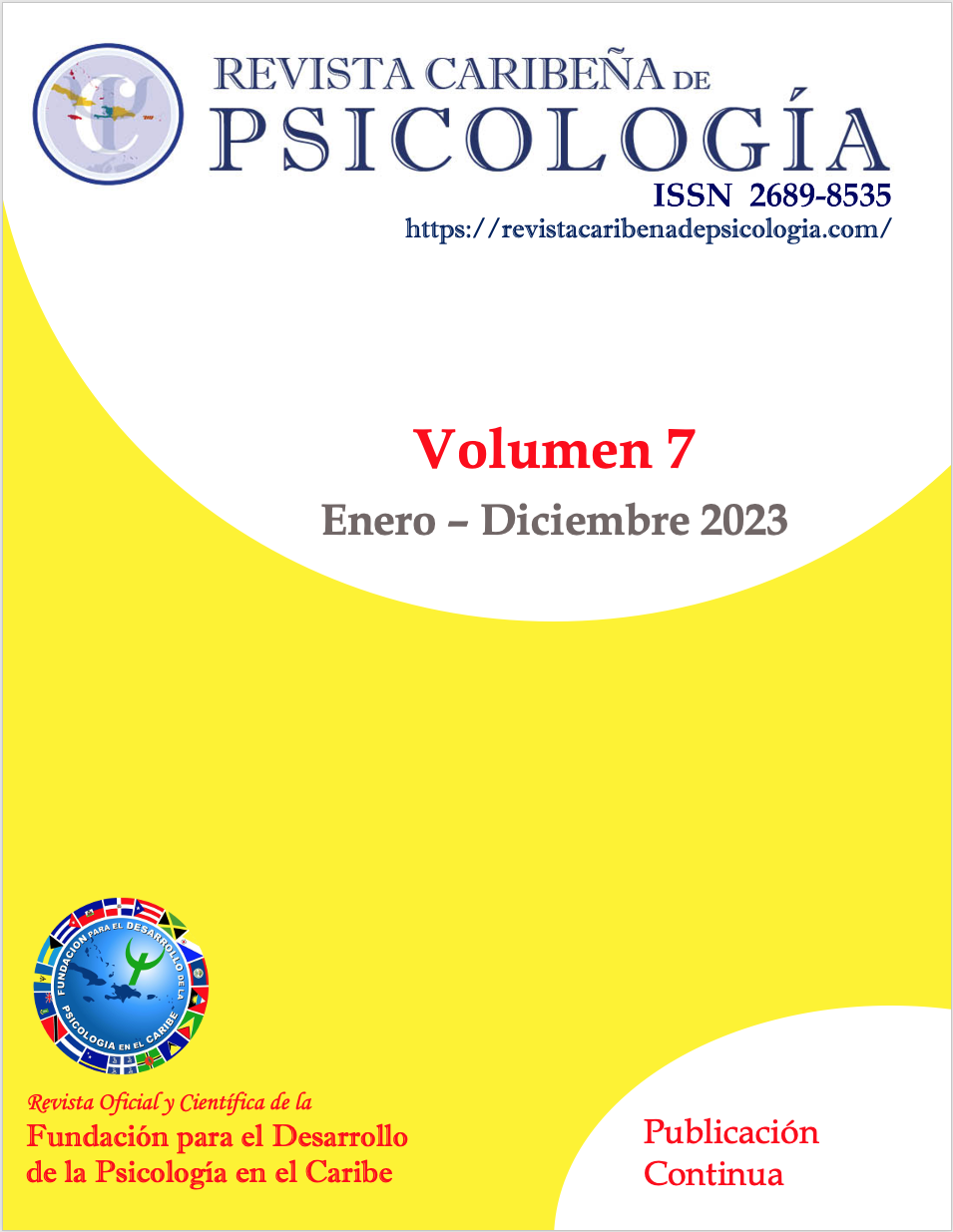Barreras Sociales, de Salud y de Salud Mental para el Cuidado: La Perspectiva de los Proveedores de Veteranos Sin Hogar
DOI:
https://doi.org/10.37226/rcp.v7i1.7201Keywords:
personas sin hogar, cuidado psicosocial, veteranosAbstract
Literatura sobre veteranos sin hogar se ha centrado en predictores, provisión de servicios, seguridad de vivienda y experiencias sin hogar. Un aspecto poco estudiado es la percepción de los proveedores de servicios en la Administración de Salud de Veteranos. Mediante dos grupos focales como parte de un Planea-Haz-Estudia-Actúa, se evaluó en 2016 y 2021 el alcance de la falta de vivienda y problemas relacionados con salud y salud mental, uso de servicios y recuperación con 22 proveedores de veteranos sin hogar en el Sistema de Salud de Veteranos del Caribe. Las narrativas indicaron 2 temas principales (cuidado de veteranos sin hogar y factores que limitan reintegración) y siete temas menores (primer enfoque, veteranos sin hogar, OLI/OLD, estigma, comunicación entre hospital y otras instituciones, salud mental y uso de sustancias, problemas legales y habilidades para vivir). Los resultados destacaron estigma institucional extendida a proveedores. También, escasez de refugios apropiados por género. Los proveedores comentaron sobre provisión de recursos más allá de vivienda para garantizar calidad de vida. Implicaciones promueven una visión más integrada del Programa con servicios de salud mental, ocupacional, recreativa y de salud, iniciativas de educación institucional para reducir estigma y coordinación más eficaz de servicios entre hospital y otras instituciones.
References
Adler, G., Pritchett, L. R., Kauth, M. R., & Mott, J. (2015). Staff perceptions of homeless veterans’ needs and available ser-vices at community-based outpatient clinics. Journal of Rural Mental Health, 39(1), 46–53. https://doi.org/10.1037/rmh0000024
Benda B. B. (2005). Gender differences in predictors of suicidal thoughts and attempts among homeless veterans that abuse substances. Suicide & life-threatening behavior, 35(1), 106–116. https://doi.org/10.1521/suli.35.1.106.59262
Bennett, A. S., Elliott, L., & Golub, A. (2013). Opioid and other substance misuse, overdose risk, and the potential for preven-tion among a sample of OEF/OIF veterans in New York City. Substance use & misuse, 48(10), 894–907. https://doi.org/10.3109/10826084.2013.796991
Carlson, E. B., Garvert, D. W., Macia, K. S., Ruzek, J. I., & Burling, T. A. (2013). Traumatic stressor exposure and post-traumatic symptoms in homeless veterans. Military medicine, 178(9), 970–973. https://doi.org/10.7205/MILMED-D-13-00080
Chinchilla, M., Gabrielian, S., Hellemann, G., Glasmeier, A., & Green, M. (2019). Determinants of community integration among formerly homeless veterans who received supportive housing. Frontiers in Psychiatry, 10, 472. https://doi.org/10.3389/fpsyt.2019.00472
Crone, B., Metraux, S., & Sbrocco, T. (2021. Health service access among homeless veterans: Health access challenges faced by homeless African American veterans. Journal of Racial and Ethnic Health Disparities, 9(5), 1828–1844. https://doi.org/10.1007/s40615-021-01119-z
Dinnen, S., Kane, V., & Cook, J. M. (2014). Trauma-informed care: A paradigm shift needed for services with homeless veterans. Professional Case Management, 19(4), 161–172. https://doi.org/10.1097/NCM.0000000000000038
Forchuk, C., Richardson, J., & Atyeo, H. (2021). A Housing First Evaluation Project for Homeless Veterans in Canada: Quanti-tative findings. Journal of Military, Veteran and Family Health. https://doi.org/10.3138/jmvfh-2020-0053
Gabrielian, S., Hamilton, A. B., Gelberg, L., Koosis, E. R., Johnson, A., & Young, A. S. (2019). Identifying Social Skills That Sup-port Housing Attainment and Retention Among Homeless Persons with Serious Mental Illness. Psychiatric Services, 70(5), 374–380. https://doi.org/10.1176/appi.ps.201800508
Henry, M., de Sousa, T., Tano, C., Dick, N. (2022). AHAR: Part 1 - Point in time estimates of homelessness in the U.S. https://www.huduser.gov/portal/datasets/ahar/2021-ahar-part-1-pit-estimates-of-homelessness-in-the-us.html
Hutt, E., Whitfield, E., Min, S. J., Jones, J., Weber, M., Albright, K., Levy, C., & O'Toole, T. (2015). Challenges of Providing End-of-Life Care for Homeless Veterans. The American Journal of Hospice & Palliative Care, 33(4), 381–389. https://doi.org/10.1177/1049909115572992
Hutt, E., Albright, K., Dischinger, H., Weber, M., Jones, J., & O'Toole, T. P. (2017). Addressing the Challenges of Palliative Care for Homeless Veterans. The American Journal of Hospice & Palliative Care, 35(3), 448–455. https://doi.org/10.1177/1049909117722383
Jones, A. L., Hausmann, L., Kertesz, S. G., Suo, Y., Cashy, J. P., Mor, M. K., Pettey, W., Schaefer, J. H., Jr, Gordon, A. J., & Gundlapalli, A. V. (2019). Providing Positive Primary Care Experiences for Homeless Veterans Through Tailored Medical Homes: The Veterans Health Administration's Homeless Pa-tient Aligned Care Teams. Medical Care, 57(4), 270–278. https://doi.org/10.1097/MLR.0000000000001070
Kline, A., Callahan, L., Butler, M., St. Hill, L., Losonczy, M. F., Smelson, D. A. (2009). The relationship between military ser-vice eras and psychosocial treatment needs among homeless veterans with a co-occurring substance abuse and mental health disorder. Journal of Dual Diagnosis, 5(3-4), 357–74. https://doi.org/10.1080/15504260903175882
LaCoursiere Zucchero, T., McDannold, S., & McInnes, D. K. (2016). "Walking in a maze": community providers' difficulties coordinating health care for homeless patients. BMC Health Services Research, 16(1), 480. https://doi.org/10.1186/s12913-016-1722-x
LePage, J. P., Bluitt, M., McAdams, H., Merrell, C., House-Hatfield, T., & Garcia-Rea, E. (2006). Effects of increased so-cial support and lifestyle behaviors in a domiciliary for home-less veterans. Psychological Services, 3(1), 16–24. https://doi.org/10.1037/1541-1559.3.1.16
Markowitz, F. E., & Syverson, J. (2019). Race, Gender, and Home-lessness Stigma: Effects of Perceived Blameworthiness and Dangerousness. Deviant Behaviors, 42(7), 919-931. https://doi.org/10.1080/01639625.2019.1706140
Martínez-Taboas, A. (2020). Pandemias, COVID-19 y salud men-tal: ¿Qué sabemos actualmente? Revista Caribeña de Psicología, 4(2), 143-152. https://doi.org/10.37226/rcp.v4i2.4907
Phillips, R. (2020). The Stigmatized Hero? A Review of UK Opin-ion Polls and Surveys on Perceptions of British Veterans in UK Society. Journal of Veterans Studies, 6(1), pp. 64–84. https://doi.org/10.21061/jvs.v6i1.150
Resnik, L., Bradford, D. W., Glynn, S. M., Jette, A. M., Johnson Hernandez, C., & Wills, S. (2012). Issues in defining and measuring veteran community reintegration: proceedings of the Working Group on Community Reintegration, VA Reha-bilitation Outcomes Conference, Miami, Florida. Journal of Re-habilitation Research and Development, 49(1), 87–100. https://doi.org/10.1682/jrrd.2010.06.0107
Rivera-Rivera, N., & Villarreal, A. A. (2021). Homeless veterans in the Caribbean: Profile and housing failure. Revista Puertor-riqueña de Psicología, 32(1), 64–73.
Santa Ana, E. J., LaRowe, S. D., Armeson, K., Lamb, K. E., & Hartwell, K. (2016). Impact of group motivational interview-ing on enhancing treatment engagement for homeless Veter-ans with nicotine dependence and other substance use dis-orders: A pilot investigation. The American Journal on Addic-tions, 25(7), 533–541. https://doi.org/10.1111/ajad.12426
Schreiter, S., Speerforck, S., Schomerus, G., & Gutwinski, S. (2021). Homelessness: care for the most vulnerable - a narrative re-view of risk factors, health needs, stigma, and intervention strategies. Current Opinion in Psychiatry, 34(4), 400–404. https://doi.org/10.1097/YCO.0000000000000715
Semeah, L. M., Campbell, C. L., Cowper, D. C., Peet, A.C. (2017). Serving our homeless veterans: Patient perpetrated violence as a barrier to health care access. Journal of Public and Nonprofit Affairs, 3(2), 223. https://doi.org/10.20899/jpna.3.2.223-234
Sreenivasan, S., McGuire, J., Azizian, A., & Holliday, S. B. (2022). Reset for systematic action: Removing VA barriers to housing and treatment for military veterans with sexual offenses. Psy-chological services, Advance online publication. https://doi.org/10.1037/ser0000642
National Alliance to End Homelessness (2022). State of Homeless-ness: 2022 edition. https://endhomelessness.org/homelessness-in-america/homelessness-statistics/state-of-homelessness-2021/
Tessler, R., Rosenheck, R., & Gamache, G. (2002). Comparison of homeless veterans with other homeless men in a large clinical outreach program. The Psychiatric Quarterly, 73(2), 109–119. https://doi.org/10.1023/a:1015051610515
US Department of Housing and Urban Development. (2015). Mayors challenge: Mayors and staff. https://www.hudexchange.info/homelessness-assistance/mayors-challenge/
Downloads
Published
How to Cite
Issue
Section
License
Copyright (c) 2023 Naiomi Rivera-Rivera, Beatriz V. Lopez-Gonzalez, Irma L. Molina-Vicenty

This work is licensed under a Creative Commons Attribution 4.0 International License.







